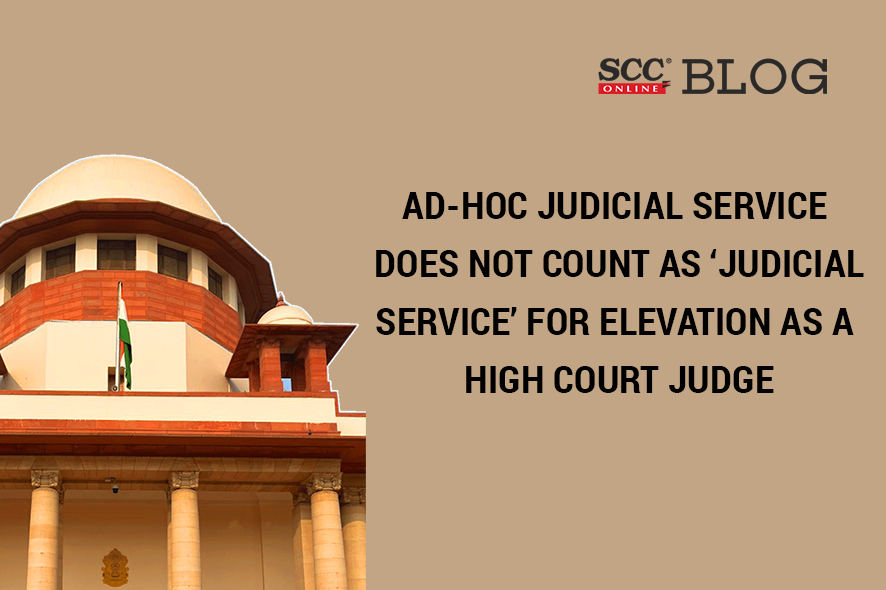Supreme Court: The bench of Ajay Rastogi and Bela M Trivedi, JJ has refused to grant any relief to the members of the Andhra Pradesh State Judicial Service who had approached the Court claiming that the service which they have rendered as District & Sessions Fast Track judges on Ad-hoc basis has not been considered as a judicial service for the purpose of seniority for elevation to the Bench of the Andhra Pradesh High Court as defined under Article 217(2)(a) of the Constitution.
The dispute
-
On 06.10.2003, the petitioners were appointed in the cadre of District & Sessions Judge on Ad-hoc basis to preside over the Fast Track Courts under the Andhra Pradesh State Higher Judicial Service Special Rules for Ad-hoc Appointments, 2001.
-
On 02.07.2013, the petitioners were appointed on regular basis in the cadre of District & Sessions Judge under the Andhra Pradesh State Judicial Service Rules.
-
It is important to note that there is no break in service of either of the petitioners in the judicial service rendered by them in the cadre of District & Sessions Judge.
-
On 05.01.2022, the seniority list of Officers working in respect of District & Sessions Judge cadre in terms of Rule 13 of the Rules, 2007 was notified and the petitioners’ names were listed at serial nos.20, 21, 22 and 23 respectively. At the same time, those officers who were junior to them in seniority were placed at serial nos.24, 28, 29, 31 and 34.
-
The petitioners, hence, claimed that while overlooking the claim of the petitioners, these “junior” officers have been elevated to the Bench of the High Court of Andhra Pradesh.
-
It was the case of the opposition, on the other hand, that as per the requirement under Article 217(2)(a) of the Constitution, a list of 27 eligible officers, in order of seniority, who have regular judicial service of minimum 10 years as Judge, was placed before the collegium. Hence, as the petitioners had not completed 10 years of “regular” judicial service, their names were not considered by the collegium. The names of District & Sessions Judges at serial nos. 1, 3, 4, 5, 24 and 27 to 48 were considered for elevation as each of them had completed 10 years of judicial service at the relevant point of time.
Supreme Court’s Analysis and Reasoning
The Court noted that earlier, in C. Yamini v. State of Andhra Pradesh, (2019) 17 SCC 228, the 3-Judge Bench of the Supreme Court, after examining their nature of appointment as a District & Sessions Judge Fast Track on ad-hoc basis under the Rules, 2001 and later appointed by Order dated 2nd July, 2013 on regular basis and becoming members of the Rules, 2007, had held that the petitioners are not entitled to claim benefit of seniority from the date of their initial appointment as District & Sessions Judge Fast Track and other consequential reliefs prayed for. However, limited benefit of service rendered as Fast Track Court Judges was granted to them only for the purpose of pensionary and other retiral benefits.
The Court, hence, held that since the services rendered by the petitioners as Fast Track Court Judges have not been recognized by the Court for the purpose of seniority except for pensionary and other retiral benefits, the plea raised by the petitioners to consider their service rendered as Fast Track Court Judges as a judicial service for the purpose of Article 217(2)(a) of the Constitution, cannot be not legally sustainable.
[C. Yamini v. High Court of Andhra Pradesh, 2023 SCC OnLine SC 176, decided on 23.02.2023]






